hankyoreh
Links to other country sites 다른 나라 사이트 링크
South Korea’s top 10 news stories of 2006
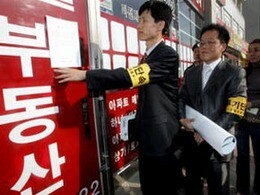
With the eventful year of 2006 coming to a close, the Hankyoreh has chosen the top 10 domestic news stories of the year.
Real estate feverAn unprecedented real estate buying and selling craze swept the nation in 2006. In the first 11 months of this year, prices of apartments in Seoul soared 19.7 percent over those of the year prior. Housing prices in the so-called "seven bubble" zones in and around Seoul jumped over a short period, as well, and in some places, real estate prices soared more than twofold during the year. Uneasy working- and middle-class citizens hurried to get loans to purchase property before the prices spiked even higher. After the government unveiled several property market stabilization measures on November 15, aimed at restricting mortgage loans and expanding the housing supply, the market has calmed slightly. But with housing prices still sky-high, worries over a "bubble burst" may not be unfounded.
North Korea’s nuclear test and resumed six-party talks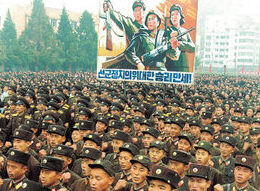
North Korea fired seven missiles on the Fourth of July - U.S. Independence Day - and conducted underground nuclear tests in Gilju, North Hamgyeong Province, on October 9. The U.N. Security Council adopted a resolution against North Korea under Chapter Ⅶ of the U.N. Charter on October 14. Since the defeat of U.S. Republicans in mid-term Congressional elections, the second-stage negotiations of the 5th round of six-party talks - stalled for 13 months - resumed in Beijing between December 18-22. There were also working-level discussions between the North and the United States, but the participants did not reach an agreement.
The first Korean U.N. secretary-general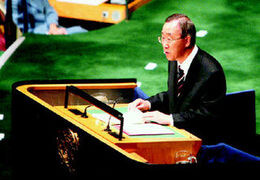
Ban Ki-moon, former foreign affairs and trade minister, became the 8th Secretary-General of the U.N. Ban is the first Asian to be elected as U.N. chief in 35 years. He also is the first leader of the U.N. from a nation still divided by war. In his inaugural speech, he pledged to settle long-standing conflicts within the U.N., as well as trying to recover the reputation of the international organization through a powerful series of reforms.
South Korea-U.S. FTA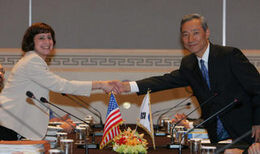
The South Korea-U.S. free trade agreement (FTA) negotiations were a hot issue throughout the year. The government claimed that the FTA was an inevitable choice in the era of globalization, while others staged street demonstrations, saying that the livelihood of the nation’s farmers would be damaged by the FTA. In another controversy, it was belatedly discovered that concessions for the U.S.’s so-called four necessary conditions - such as a reduction of the quota on the number of theater screenings of Korean films - were arrangements made in advance of the official negotiations in order to get the U.S. to come to the table. After five rounds of negotiations, no significant progress has been made on the deal. The nations are set to head to the negotiating table two more times between now and March next year.
Bird flu returns after three years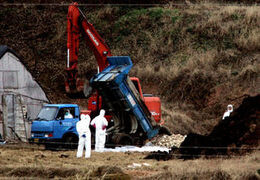
Avian Influenza, which first came to Korea in 2003, recurred in Iksan, North Jeolla Province, on November 22 after three years of absence. The bird flu rapidly spread to neighboring provinces. In the process, millions of birds were slaughtered. As the disease is highly virulent, the nation’s quarantine authorities and farmhouses are still in a state of tension. Newcastle disease, a fatal poultry infection which sees outbreaks nearly every year, was found again, this time in Cheonan, South Chungcheong Province, creating even more strain for quarantine authorities.
Controversy over wartime operational command transfer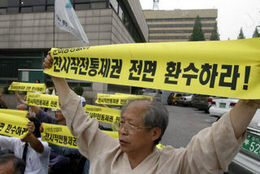
Heated debate surrounding the transfer of wartime operational control over the South Korean military from Washington to Seoul proved a litmus test for reading the nation’s ideological topography. President Roh Moo-hyun considers the return of wartime command as the core of the nation’s self-defense, as well as a matter of national pride. Due to such a philosophy, South Korea and the United States have been playing a tug-of-war over the issue, especially on the matter of timing, and in their annual security talks in October, the two sides agreed to transfer operational command between October 15, 2009 and March 15, 2012. However, the nation’s conservatives, including former military generals, urged the government to stop discussions on the regaining of command. The main opposition Grand National Party (GNP) also raised an objection over the agreement, citing the inappropriate timing, huge cost, and the move’s perceived effect on the South Korea-U.S. relationship.
Roh opens mouth, raises hackles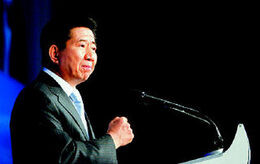
President Roh Moo-hyun has continuously made very straightforward remarks this year. Many were in response to the dissention within the ruling camp and proposed political moves in anticipation of the 2007 presidential election. During a Cabinet meeting on November 28, Roh said, "I hope I will not become the first president that fails to serve his entire term in office." On November 30, he raised a strong objection to the proposal by members of the ruling Uri Party to form a breakaway party. At a meeting of the National Unification Advisory Council on December 21, Roh called the appointment of Goh Kun as his administration’s first prime minister a "mistake," and went on to fiercely criticize senior members of the military for opposing the transfer of wartime military command.
Gambling game scandal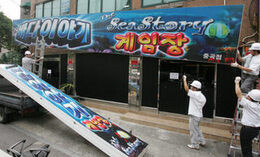
A report in August named a nephew of President Roh Moo-hyun as being allegedly involved in corrupt business practices surrounding the speculative slot-machine game, "Sea Story." Soon after the news broke, the media reported on a number of politicians accused of receiving bribes from the maker of the game, but most of the allegations were found to be groundless after the prosecution investigated. However, wrongdoings involving related industries, the Ministry of Culture and Tourism, and the Korea Media Rating Board were unveiled one after another. Most of the adult gaming venues were closed for a period of time. However, the gaming rooms are starting to open once again, and debate remains whether certain video games of chance should be considered gambling.
Uri Party faces a series of defeats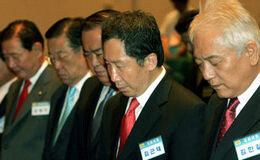
The ruling Uri Party suffered consecutive defeats in elections held in 2006. In the May 31 local elections, the party won only one of the 16 mayoral and gubernatorial posts - the governorship of North Jeolla Province. In the July 26 by-elections to choose four lawmakers, the party failed to win a single National Assembly seat. The party again experienced a crushing defeat in the October 25 by-elections. With consecutive electoral defeats, the party has lost its momentum and has fallen into a swirl of controversy regarding both conflicts between the party and the presidential office and also plans among party members to break off and form a new party. In the meantime, the party’s approval ratings have plummeted to the single-digit range.
The teenage sports star was born
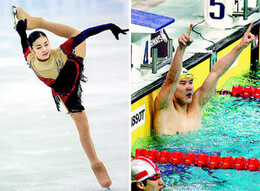
Please direct questions or comments to [englishhani@hani.co.kr]
Editorial・opinion
![[Column] Has Korea, too, crossed the Rubicon on China? [Column] Has Korea, too, crossed the Rubicon on China?](https://flexible.img.hani.co.kr/flexible/normal/500/300/imgdb/original/2024/0419/9317135153409185.jpg) [Column] Has Korea, too, crossed the Rubicon on China?
[Column] Has Korea, too, crossed the Rubicon on China?![[Correspondent’s column] In Japan’s alliance with US, echoes of its past alliances with UK [Correspondent’s column] In Japan’s alliance with US, echoes of its past alliances with UK](https://flexible.img.hani.co.kr/flexible/normal/500/300/imgdb/original/2024/0419/2317135166563519.jpg) [Correspondent’s column] In Japan’s alliance with US, echoes of its past alliances with UK
[Correspondent’s column] In Japan’s alliance with US, echoes of its past alliances with UK- [Editorial] Does Yoon think the Korean public is wrong?
- [Editorial] As it bolsters its alliance with US, Japan must be accountable for past
- [Guest essay] Amending the Constitution is Yoon’s key to leaving office in public’s good graces
- [Editorial] 10 years on, lessons of Sewol tragedy must never be forgotten
- [Column] A death blow to Korea’s prosecutor politics
- [Correspondent’s column] The US and the end of Japanese pacifism
- [Guest essay] How Korea turned its trainee doctors into monsters
- [Guest essay] As someone who helped forge Seoul-Moscow ties, their status today troubles me
Most viewed articles
- 1[Column] The clock is ticking for Korea’s first lady
- 2Samsung barricades office as unionized workers strike for better conditions
- 3[Editorial] When the choice is kids or career, Korea will never overcome birth rate woes
- 4S. Korea, Japan reaffirm commitment to strengthening trilateral ties with US
- 5[News analysis] After elections, prosecutorial reform will likely make legislative agenda
- 6Japan officially says compensation of Korean forced laborers isn’t its responsibility
- 7[Editorial] As it bolsters its alliance with US, Japan must be accountable for past
- 8[Editorial] Does Yoon think the Korean public is wrong?
- 9Why Israel isn’t hitting Iran with immediate retaliation
- 10[Interview] Learning about the Sewol tragedy through BTS